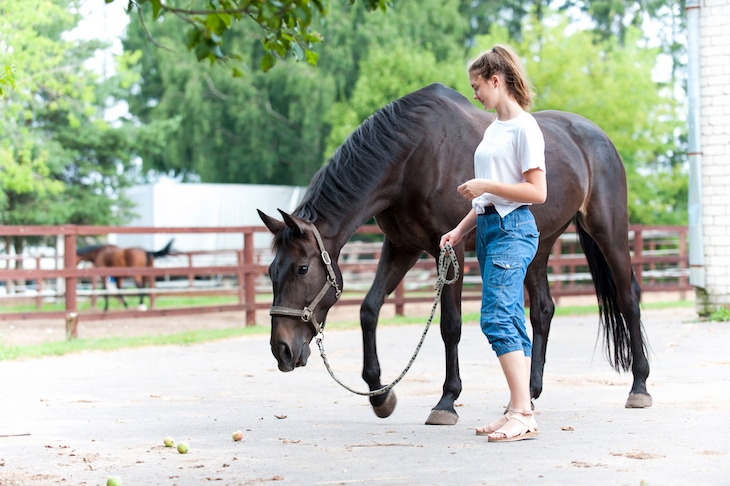The first time I saw a woman leading a horse down the lane on a lead, both she and it dressed from head to foot in high viz, she in a crash helmet and safety vest, I thought nothing of it.
But that was a good year ago now, and since then the increasing number of terrified, fully armoured women leading horses out for a walk like they were dogs rather than riding them means I can no longer pretend this practice is a one-off or not really happening.
Much as I would like to turn a blind eye to the increasing madness in the horse world, I have to confront the reality that this world is now beset by women who can’t ride horses.
Women who have no intention of ever learning to ride horses. Women who may even be labouring under the delusion that it is cruel to ride horses. I suspect that even if they say the latter, their po-faced attitude is really a foil for the fact that they are quite hopelessly inept in a sporting capacity.
These women who want to play ponies without getting on would have been laughed out of town a generation ago, not least because horses used to be thought of as working animals needing proper exercise.
But something very odd has happened to the pursuit once known as horse-riding. You would think the clue was in the title. Horse Riding.
Lately I have noticed that this once great pastime is becoming all about Horse Not Riding.
They troop past my field several times a day in their Day-Glo shouting ‘Can you please just wait there and not move while I come past!’ at anyone who comes within 20 feet of them.
As I am invariably at my field gate tacking up Gracie to go for a ride, they look at my saddle and bridle snootily.
I realise this is all about the rise of something called natural horsemanship, or unnatural horsemanship as I like to call it. For truly, there is nothing natural about covering a horse in a Day-Glo sheet in bright sunlight, putting a little pink tasselled hat on its ears, and taking it for a walk on a lead. If it can walk. Because sometimes you see these poor dog-horses hobbling along the road.
They don’t like shoeing, these natural people. They take the shoes off as soon as they get the horse home once they have ‘rescued’ it. They don’t buy horses. They rescue them. They rescue them by buying them from stable yards where they have been — gasp — ridden.
If they buy them from a racing yard, they say they have rescued them ‘from the racing industry’.
In practice, this means they have bought a slim, fit thoroughbred who isn’t fast enough to win races and within months fed it and not ridden it to within an inch of its life. It may soon pass away from laminitis, but if not it will be brain-dead from boredom in six months. For it is about to be dressed in Day-Glo and taken for a walk once a week like a dog.
They don’t like worming, they don’t like vaccinating, they don’t want to put any chemicals in these horses they’ve ‘rescued’ from a life of being cruelly dosed with unnatural substances to keep them disease-free. They give them turmeric for every complaint.
I’m fairly sure this is not what Monty Roberts, the original horse whisperer, intended when he started doing demos about natural horsemanship.
Pat Parelli is another American horse trainer who built an empire on the word ‘natural’. I can’t believe it makes him proud when he sees overweight women leading overweight, unshod horses down country lanes while screaming in panic at passers-by to get out of their way because they can’t possibly pull on its mouth.
Yes, Monty and Pat really started something when they sold people who are scared witless of horses the dream that they can build a relationship with their equine companion ‘on the ground’.
In reality, the only relationship you can build with a horse is based on a contract that you keep them fit and healthy. Not mooching aimlessly around a field eating grass 24/7.
The natural folk do catch their horses every so often, and bring them in to feed them more food. They pet them, brush them and, if too frightened to take them out for a walk, they let them off the lead in the paddock and try to get them to follow them around as if they were Robert Redford in The Horse Whisperer.
At which point the horse invariably wanders off to eat more grass, ignoring this lunatic who owns them. ‘Please, will someone just take me back to the racing yard?’ their eyes plead.







Comments